
The suite of Aurochs Ford 1
He wakes up again, without haste, without a jump, as one comes back from a journey that cannot be written. The day is now frankly rising, a grey day, low, with that dull light of the plains mornings, when the Marne seems to hesitate to show itself. He lies for a moment, his eyes lost in the cracks of the ceiling.
But something is calling him
He rose without haste, crossed the corridor to the old buffet of drowning in the entrance. He opens the bottom drawer, which he hasn’t looked into for a long time. It was there, he knew. He does not even ask himself how. The gesture is safe, almost programmed. An evidence from another age.
Under piles of papers, old device manuals, and a children’s necklace made of plastic beads, he finds it.
The rock
A piece of flint, not larger than an egg, but cut clean, angular, with splinters like bevels. One worker had thrown it, among others, over the fence years earlier at the end of a day’s work.
He picked it up without much thought. He kept it because it had a funny look, a shape that seems to be made on purpose, a way of holding in his hand, in his hand, as if it had been thought for this.
He takes it. The contact is immediate. It’s not stone, it’s memory. In the hollow of his palm, the shape of the flint conforms exactly to that of his hand. Not that of the modern man, but that of another him, older, more essential. A hand callous, agile, naked, accustomed to wind and blood. A hand that knew the stone.
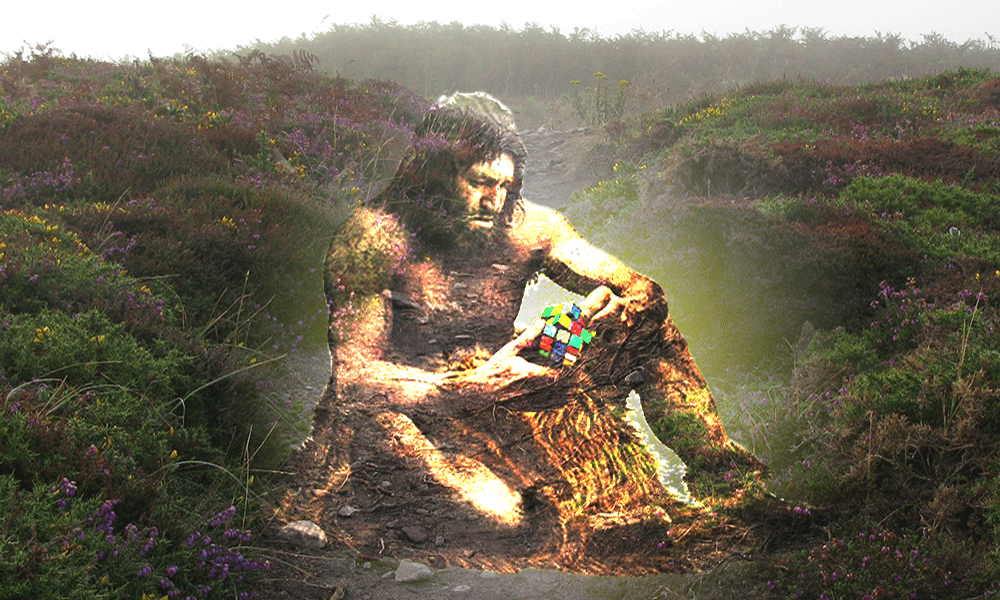
He closes his eyes
He has no vision this time, no beasts or clearings. Just a certainty. He held it. He cut it. He struck this flint against another stone, blew on the shards, cut off the skin of his thumb. He had used it to strip a still warm carcass, to cut a branch, to survive.
He no longer dreams, he remembers.
He reopens his eyes. The sky outside is tin-colored. He stands there for a long time with the flint in his hand, standing in his house on rue du Gué aux Aurochs. He knows that something has just fallen. It’s not nostalgia. It’s a reintegration, a return.
He simply whispers, as one recites a prayer: “I am of those who have remained”. Then he slips the stone into his pocket, like a talisman, and walks out.
He walks long
The cobblestones of Quai Fernand-Saguet are still wet from the night. The Marne, heavy and dull, rolls slowly between its high banks, indifferent to the century. Above, barely visible, the rue du Gué aux Aurochs briefly winds between buildings and low houses, and even higher, recent buildings, the new city tries to forget what it covers.
He holds his flint in his pocket like a piece of identification. It is no longer an object, but a proof.
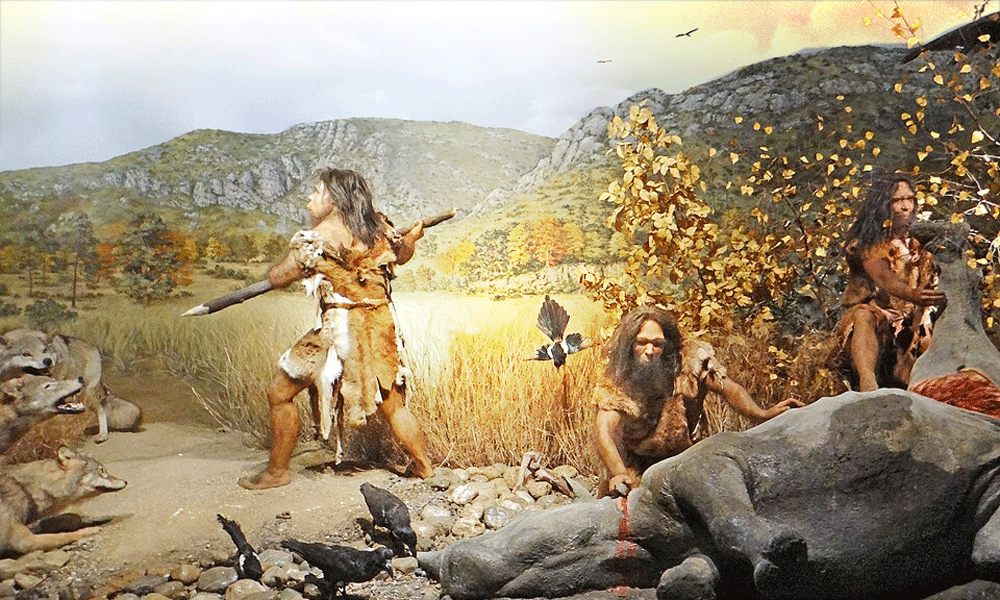
A reminder. A key
Then, little by little, his eyes change. Or rather, something opens in his gaze. It’s not the people he sees on the wharf — joggers, walkers, homeless people, bike delivery men, families. It’s who they were. Or who they still are, though.
There, not far from him, is a young man with an almost Neanderthal profile, powerful neck, low eyebrows, who looks at the water with an ancient calm. Further on, a woman from East Africa, slim silhouette, carries her child against the hip with the same ease as at the banks of the Omo, one hundred thousand years ago. An old woman with a curved back drags a caddy slowly — but he sees, in the swaying of his shoulders, the rhythms of an endless walk in the steppe, the burden of migration.
It’s not a daydream, it’s recognition. They’re there. They’ve come back.
They are there
They are not many, but he distinguishes them. Those who had walked from the far reaches of Asia, from the Red Sea, from the primeval forests, converged here — to this very spot in the alluvial plain, this ancient threshold, this still-living ford.
Some people come by chance, it is believed. Refugees. Exiles. Uprooted. But the old MaisonnaisMaisons Alfort resident now knows that chance, which does not exist, does things very well. These beings carrying forgotten lineages, did not get lost on the way: they followed a call. They return.
There is no such thing as chance. Everything that happens is wanted.
Return where the aurochs drank, where the hunters painted their hands in negative on the wall of a disappeared cliff. Where the Marne and the Seine mixed their waters to trace the way of the tribes.
He stops. A child, alone, looks at him from the other side. Their eyes cross. In this look, there is nothing of contemporary childhood. There is the gravity of a memory too old to be named. As if they had already seen each other. As if both had, one day, hunted a large deer in the mist.
And then
And then, the old MaisonnaisMaisons Alfort resident understands what it announces. Not a backward step, not a restart. But a revival. The ground remembers. Time is winding. Those who had gone very far, very long, are returning to the origin.
Why now? He doesn’t know. But he knows it’s not a coincidence. That the fracture of the modern world, its abysses, its noises without memory, have opened a breach. And through this breach, the watchmen return.
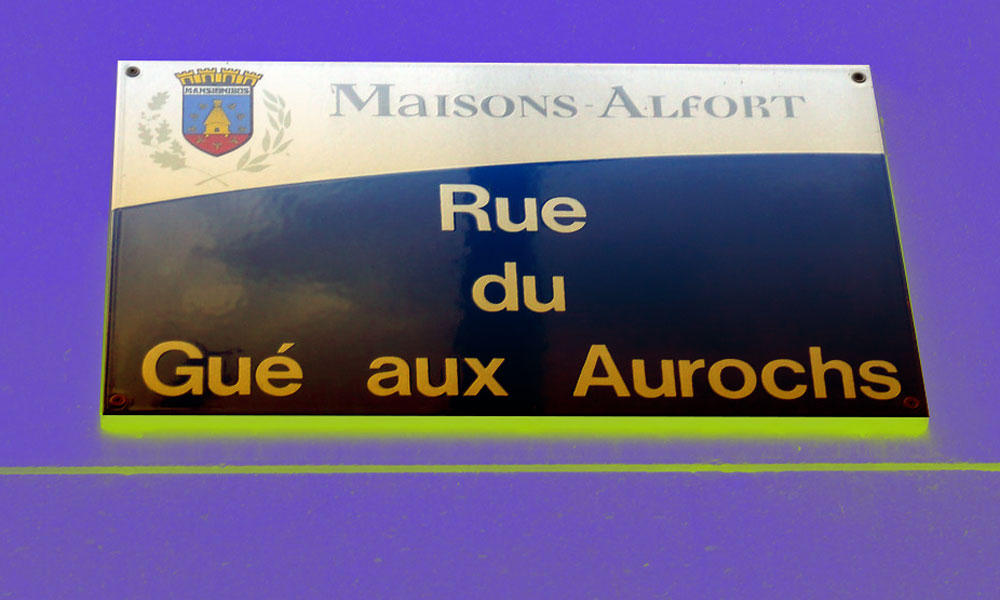
He resumes his walk
The buildings barely vibrate, the lampposts glimmer softly, but beneath his feet he feels the beat of centuries. He was no longer alone. Others will wake up. Others will remember. And that day, perhaps, we will hear again the rumbling of beasts, not in dreams, but in reality.
As he continued his walk, something changed. It was neither a new light nor a spectacular sound, but silence. One of those rare, full, almost musical silences that only the suspension of the modern world can offer. It happened just after he crossed the Charentonneau bridge.
It stops abruptly. A breath. A trembling in the air. As if space, even space, were tightening around a point. A new assemblage. He looks around him, everything seems the same: the river, the trees, the asphalt strip… and yet it is not. The world holds its breath for a moment.
Then he sees the man
A stranger, sitting on a stone bench. Not old, not young. Dressed in a coarse wool coat, far too heavy for the season, and undefinable trousers — neither modern nor antique: out of time. The man holds a long stick, simple, knotty, engraved with signs that the MaisonnaisMaisons Alfort resident, without being able to read them, recognizes.
Their eyes meet. And there is no surprise. No hello. No request.
The bench man simply says, “You remember. Finally.“
The old man sits down, without a word. He still holds his flint in his hand, like an offering. The man smiles, softly. A slow, serious smile, like the ones we used to make around the fire, once the deer was shared. Then he reaches out his hand, touches the flint with his fingertips, and utters a word in a language that the earth itself seems to understand.
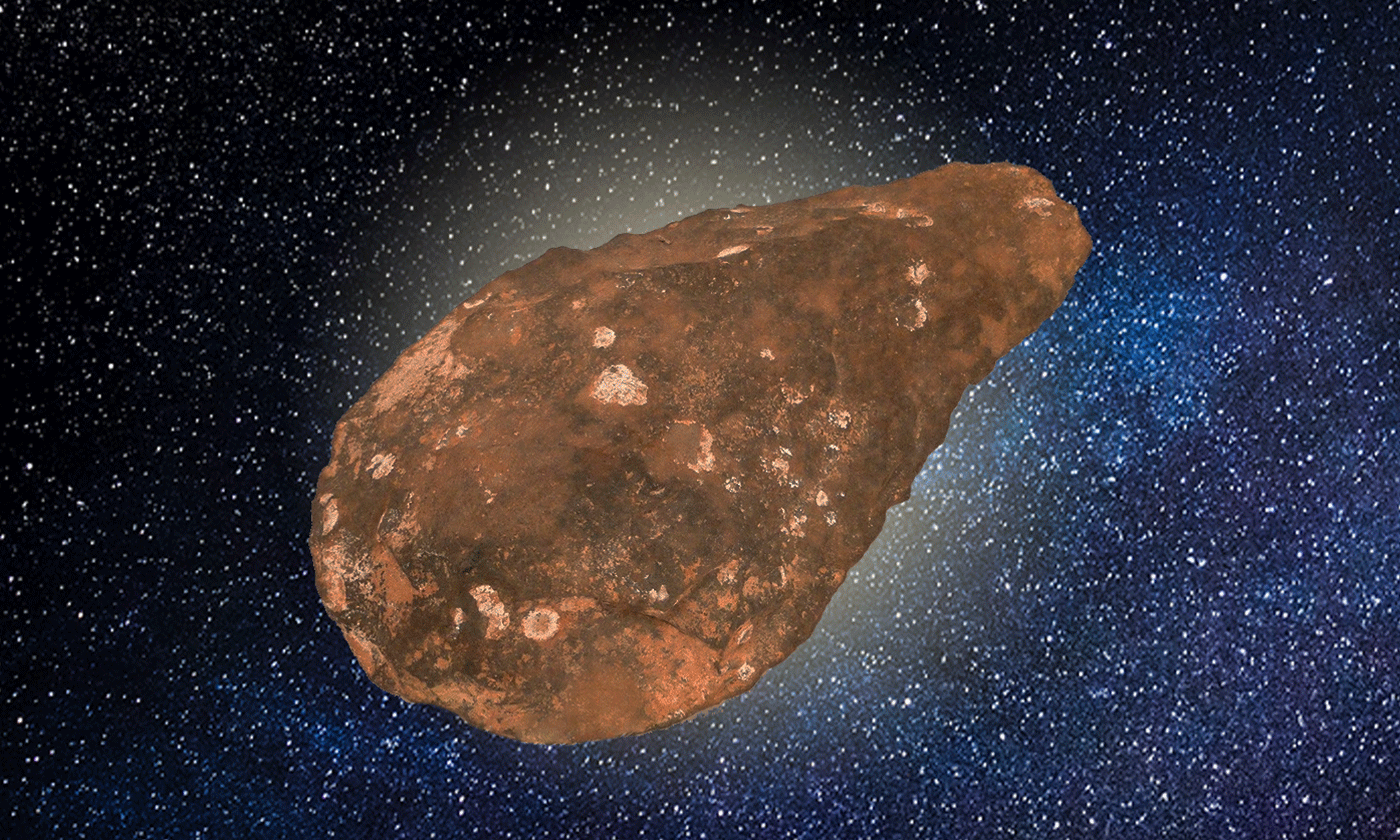
And in this word
In this word, the MaisonnaisMaisons Alfort resident hears the announcement. It has no form yet, but it was there. Something will come back. Not the past, not prehistory. But the spirit of the beginning. The certainty that man could still walk as a brother in the world, speak to rivers, honor beasts, remember that fire is a mystery and not a tool.
The bench man stands. He is not alone. Others appear now, among the trees, on the banks, in the reflections of the river. A woman with ash-white hair, a dark-skinned boy holding a shell in his hand, an old twisted figure under a canvas cape. They have nothing in common, except this: they came back.
The MaisonnaisMaisons Alfort resident feel his heart beating very slowly. No more fear. No more doubt. He also got up. The day was advancing. The city continued, far away, its noise. But there, on this forgotten quay, the Veilleurs had gathered. And he understood that the Ford was going to open again.
Doubt is an unpleasant mental state, but certainty is absurd.
He’s there
He is still there, standing by the bench when the child reappears. He runs along the shore on the other side. The old MaisonnaisMaisons Alfort resident recognizes him immediately. Not by his clothes, not by his figure, but by that look — deep, old, almost frightened — he had seen earlier. This look is not like a child. It’s an expectation. And at that moment, time bends.
Not like in a dream, where anything can happen, no. Rather like a memory that we never had but that we carry in ourselves, embedded in the fibers of being. Old MaisonnaisMaisons Alfort resident sees himself. Or more exactly, he sees who he was a hundred thousand years ago or more. A child of a lost clan. A watchman already.
There is this child. Dressed in skins, a necklace around his neck, and above all, by hand, a strange thing, beautiful, bright as frost: a unique flint, polished with an almost mystical attention. It was a tool, but also a symbol. An object of transmission. He wore it that day, in the morning of a hunt that turned badly, when the ford was stormed by beasts, fear, disorder, and a cry in the mist sealed the end. The child died without being able to pass on his gift.
And since — for a hundred thousand years or more — he waits.
He expects
The MaisonnaisMaisons Alfort resident suddenly understood him. On his way back, the child tried to get together. He tried to fix the broken loop. To finally give what he had not been able to transmit. For in ancient times, not transmitting what one wears was to condemn oneself to wandering.
But there is a paradox: they cannot meet. A single being cannot occupy two bodies in the same place in the world. The transmission is impossible. And yet it must take place.
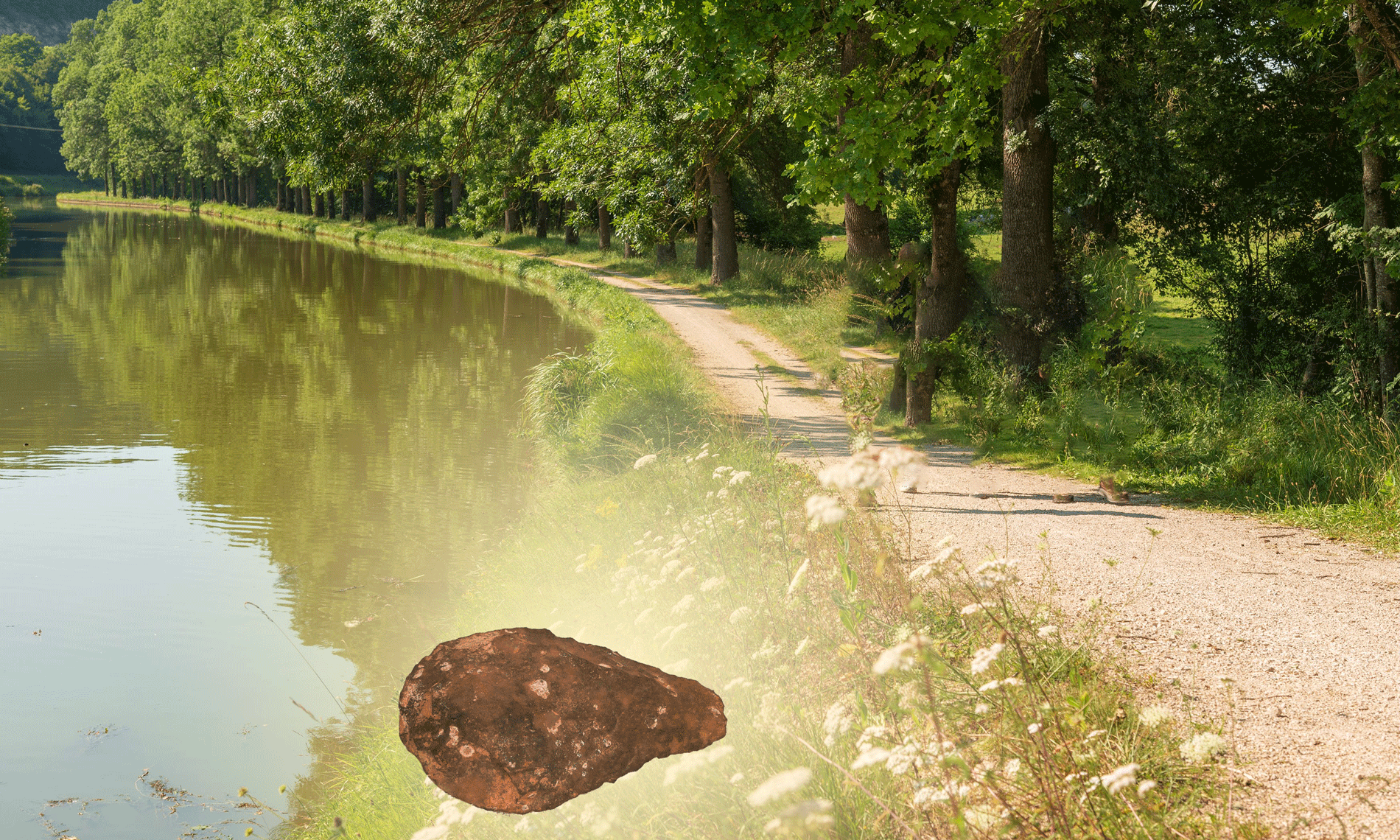
What only a watchman
So the MaisonnaisMaisons Alfort resident does what only a watchman can do. He disposes of his own flint. The one picked up once in the rue du Gué aux Aurochs.
He lays it gently on a block of stone, there, at the edge of the water, at the exact point where the lines of sight intersect-this point where the world swings between reflection and reality. Then he backs away. You must not see, do not interfere. You must let be.
And on the other side, the child stops. His look changes. Not more full of expectation, but relief. He felt. He runs, disappears in a stream of light, and the vibration in the air is softened.
The old MaisonnaisMaisons Alfort resident returns to the stone. The flint is no longer there. In its place, the child’s flint and an amulet. Simple, strange. Made of bone, ivory lintels, a ring of blackened amber. It vibrates in the palm like a sleeping heart.
The donation had taken place
The paradox is lifted, not by confrontation, but by trust. By listening to greater forces. He now knows that the loop is not a trap: it is an oath. And this amulet, light and warm, now carries everything: the memory of the clan, the silence of the ford, the cry in the mist, and the transmission finally accomplished.
He walks endlessly, without purpose, the amulet in his pocket, fingers sometimes closed around him as around a sacred word that is not pronounced. Nothing in the world around him has changed. Cars pass by. Horns go by. A bicycle rattles on the docks. A jogger gasps. An ordinary city, a grey morning in the Ile-de-France. But he knows. Something has gone wrong. It wasn’t just a memory of a past life.
This is not a sentimental daydream about the continuity of the species. It is a fault open in time — a brief interstice, very rare, where a being could meet himself at two ends of the same spiral of existence to perform a gesture suspended for one hundred and fifty millennia.
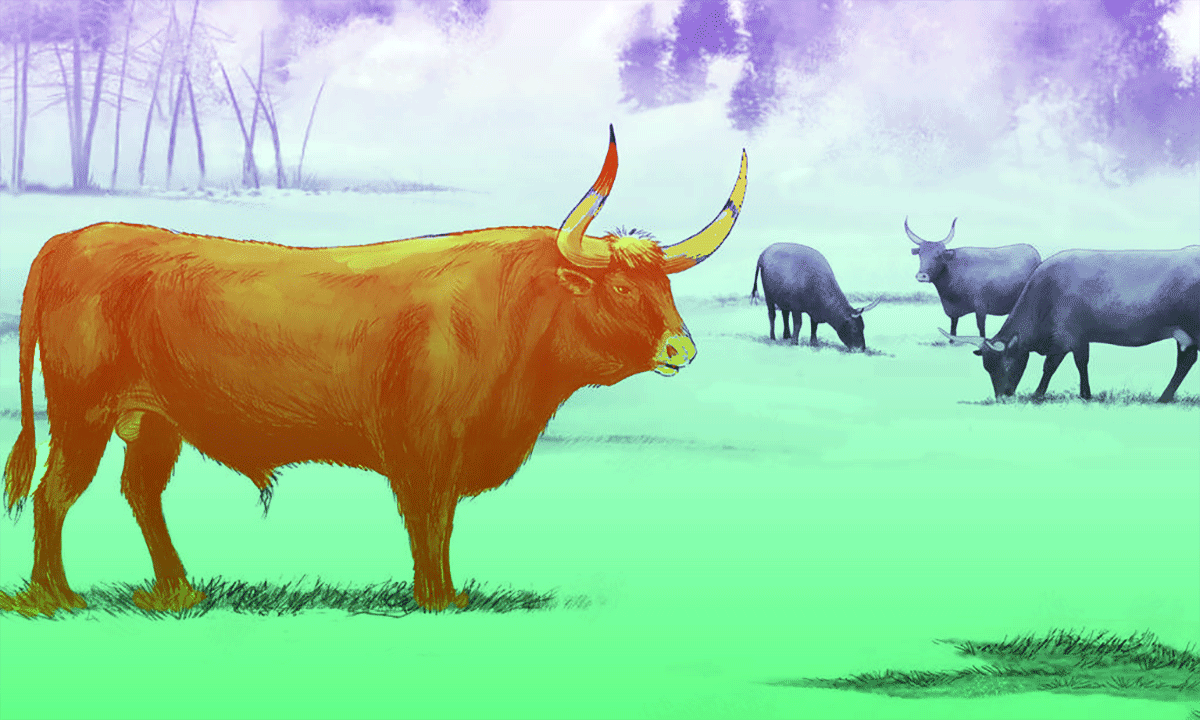
And this gesture
And this act — this completed gift — had immense consequences. Heartbreaking. Transcendent.
Because the present world, the world of now, this noisy, saturated world, launched in a sterile race, has precisely forgotten what it had just found: the meaning of sacred transmission.
Modern societies have broken the thread. Objects, which claim to be connected, are no longer carriers of memory but of usage. The dead no longer watch over the living, children no longer inherit debts, lands are no longer trodden to be sold. And in that rupture, something was lost — not knowledge, but correctness.
The meeting
The meeting at the edge of the ford, between the child before and the man today, was not only a personal healing. It was an act of universal reparation. A re-tuned note in the symphony of the species.
And in this vibration, others would hear. Other carriers. Other watchmen. Other awakened. The signal was given. And this signal is not a word, nor an event, nor even a miracle. It is a presence restored in time, a repaired line between the living today and the living before, those who knew how to walk without dominating, talk without breaking, kill without forgetting.
The amulet vibrated, sometimes, slowly. As if it emitted something. A wave, a call. And the old MaisonnaisMaisons Alfort resident, now, understands what he must do. Not to save the world, but to remind those who know they have forgotten. He would not be alone, he never was. The others will rise.
The ford had spoken.
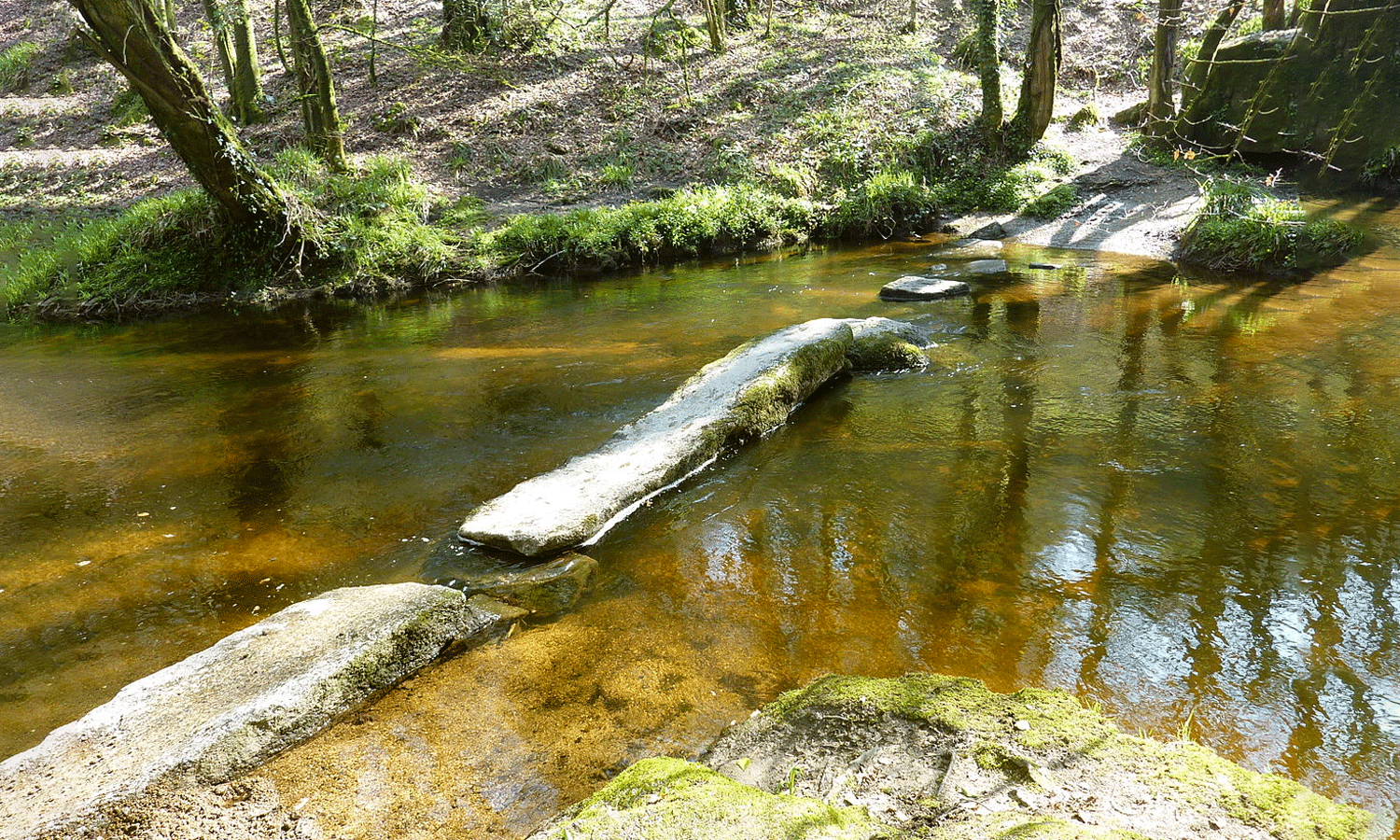
Articles of Alain Aillet


